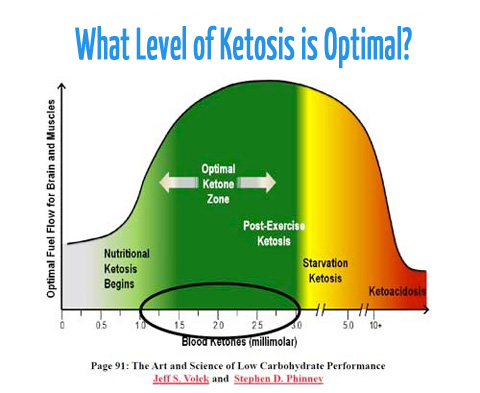What's the difference? 100g, 50g, 20g, zero?
Options
Replies
-
There is soooo much mythology around this stuff, it makes me a little crazy sometimes. If you are eating 0-20g, you are making as many ketones as your body can possibly make. In addition to that, you are guaranteed to be making your own supply of glucose from protein.
And we haven't even talked yet about whether "ketosis" has any significant weight loss benefits. 0
0 -
We have no idea about consistently elevated cortisol from long term keto adapted folks.
The first study looked at subjects over a 4-week period. Yeah, that's not terribly long term, but it's long enough for them to be keto-adapted (which is a semi-meaningless term). There are some interesting side-notes in that study -- e.g., elevated cortisol was a function of low carb intake, not weight loss.
Anyway, I'm pretty convinced by these studies, and they also make some metabolic sense to me, but it doesn't tell us if those cortisol levels are "bad" for us.
In the end, we can be certain that our carb intake can change our physiological state. We don't know much about the long-term effects of these changes because most people don't stay in these very-low-carb states very long. At least not until everybody on the interwebz started biohacking.
Hack away!
4 weeks is enough to get just barely keto-adapted (which does have a definition -- the body is using the ketones it's making at about the same rate as it's making them), but nowhere near long enough to be considered "long term keto dieter." It's well known that people continue to see improvements in various hormonal pathways the longer they stay in ketosis, for several months after starting.0 -
There is soooo much mythology around this stuff, it makes me a little crazy sometimes. If you are eating 0-20g, you are making as many ketones as your body can possibly make. In addition to that, you are guaranteed to be making your own supply of glucose from protein.
And we haven't even talked yet about whether "ketosis" has any significant weight loss benefits.
What's your authority for that statement please @wabmester sometimes your statements conflict with those who have done significant research in this area. I'm not saying you're wrong, but would be grateful if you would source statements like that. TX.
0 -
There are stages of keto-adaptation. Your brain seems to adapt VERY quickly. Your muscles take longer, but for sedentary folk, they already spend most of their time in "fat burning" mode. The muscle adaptation kicks in more for higher activity levels.
What's fascinating to me is that one of the longer-term effects seems to be a switch from the liver to the kidney for making glucose. Most people don't even know the kidneys can make glucose. Very odd states we are getting ourselves into here. 0
0 -
There are stages of keto-adaptation. Your brain seems to adapt VERY quickly. Your muscles take longer, but for sedentary folk, they already spend most of their time in "fat burning." The muscle adaption kicks in more for higher activity levels.
What's fascination to me is that one of the longer-term effects seems to be a switch from the liver to the kidney for making glucose. Most people don't even know the kidneys can make glucose. Very odd states we are getting ourselves into here.
Maybe eating lots of carbs is the odd state?
0 -
totaloblivia wrote: »Maybe eating lots of carbs is the odd state?
Definitely! We are not adapted to drinking coca cola, for example. I love the factoid that our entire blood sugar supply is homeostatic at around 5-7g. Eat more than that in one sitting, and it must be dealt with pronto!
0 -
totaloblivia wrote: »There is soooo much mythology around this stuff, it makes me a little crazy sometimes. If you are eating 0-20g, you are making as many ketones as your body can possibly make. In addition to that, you are guaranteed to be making your own supply of glucose from protein.
And we haven't even talked yet about whether "ketosis" has any significant weight loss benefits.
What's your authority for that statement please @wabmester sometimes your statements conflict with those who have done significant research in this area. I'm not saying you're wrong, but would be grateful if you would source statements like that. TX.
Sorry, missed this in the flurry of posts. I just read (and post) studies and try to connect the dots. I'm not sure what you'd like a source for that I haven't already posted in this thread.
Of the guys who write books, Phinney and Vogel are probably the only ones who have done actual studies themselves. Listen to them instead of me, but keep in mind that they are trying to keep things simple rather than trying to teach you how this stuff works. Last I checked, they recommend a range of around 50g/d carbs for the first few weeks and then an increase after that. That makes perfect sense to me. I don't recall them suggesting a target for blood ketone levels.0 -
I have to correct myself. It's Volek, not Vogel. And here are the ketone ranges they consider "nutritional ketosis":

From those who monitor their ketone levels often, they have observed variations through-out the day. I've read that some of them who have been in ketosis for years observe relatively low levels compared to the above levels that P+V consider "optimal."
Unlike blood sugar, I'm not aware of any homeostatic level of ketones that the body tries to maintain. That's why "optimal" doesn't make much sense to me, but go with the experts on this one. 0
0


